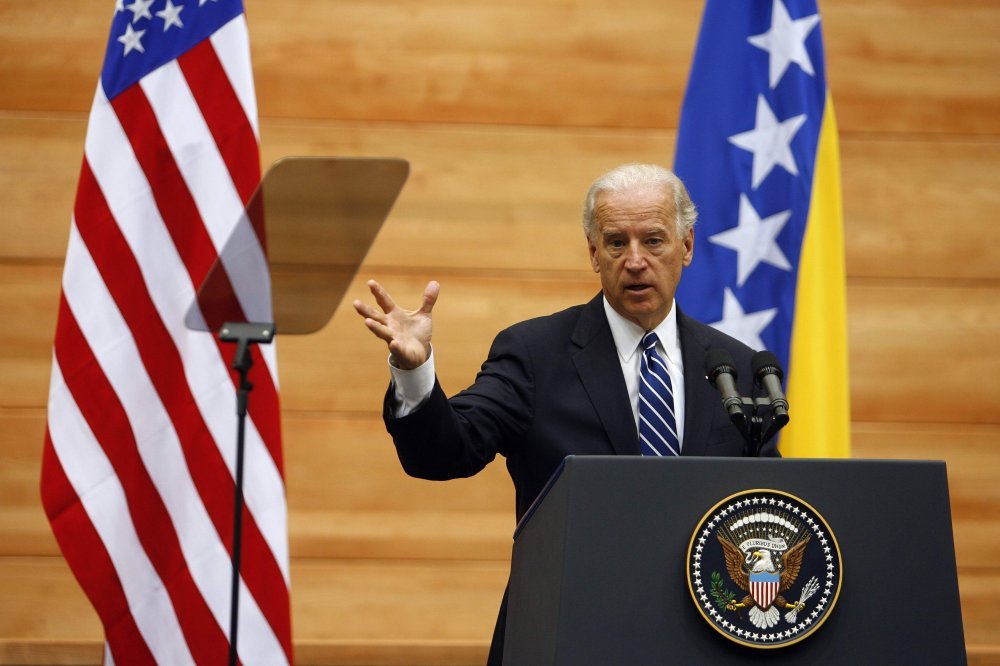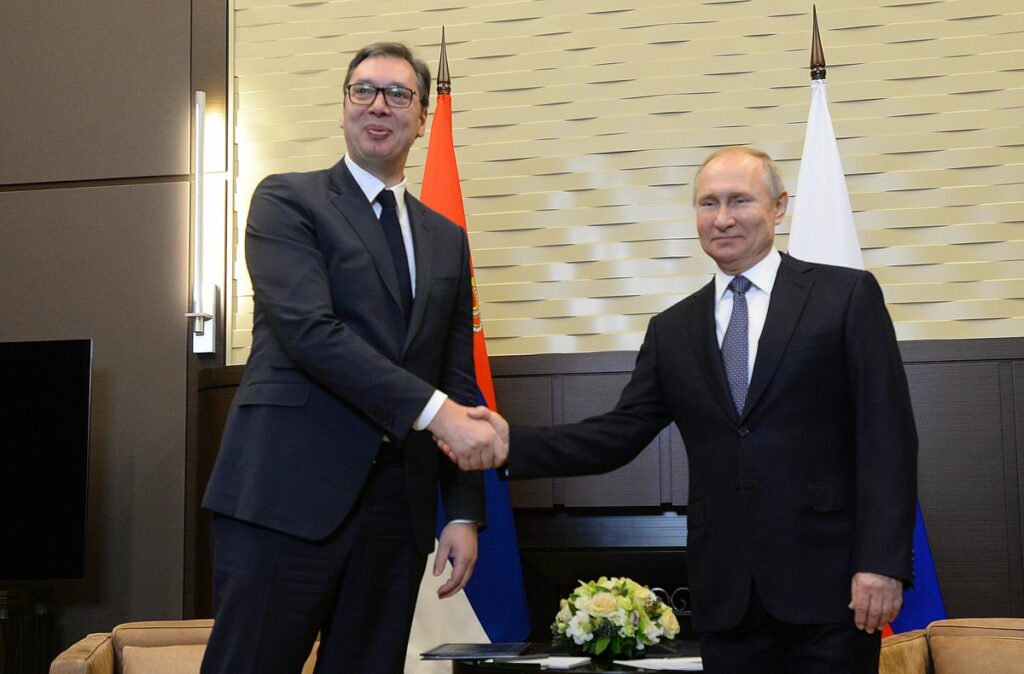Written by: Atlantic Initiative
The American presidential election held on 3 November 2020, probably had the most dramatic finale in the 244-year long history of the most powerful world democracy, comparable only with that of 2000 (Al Gore – George W. Bush).
Despite the fact that, as of this publishing, the outgoing Donald Trump has not recognized his defeat to the Democratic challenger Joe Biden, and that the entire world watched the painful efforts by the outgoing head-of-state to question, or even suspend, the election process (“Stop the vote count,” will be recorded in the political history of the United States), it is clear that the 46th US President-elect won 306 electors, comfortably exceeding the required 270 electors. Biden’s victory was the most convincing one in the history of US elections.

(PHOTO: TPORTAL.HR)
On November 7, American leading media outlets proclaimed Biden the winner of the US presidential election after he was announced the winner in the crucial state of Pennsylvania. Since then, it has been confirmed that the Electoral College (538 electors) would convene on 14 December. The college will vote and then send their votes to several addresses, including to th address of the current US President.
On 6 January, both the Senate and the House of Representatives will verify the electoral votes. Finally, as defined in the Constitution, the new president’s inauguration will take place at noon on 20 January in front of the Congress, and Biden will officially assume the office of the US President.
Prof. Dr Adis Maksić, Associate professor at the Department for International Relations and European Studies at International Burch University, spoke to the Atlantic Initiative about the effects of the US election, Biden’s doctrine, how different it may be from former administrations, and what can the Western Balkan countries expect.
Maksić went to high school in the United States, and then attended Michigan State University, where he graduated with a Bachelor’s Degree in Criminal justice criminalistics. Fascinated by the influence of politics on everyday lives, identities, ambitions and lifestyles, he enrolled at Virginia Tech in 2008 and obtained an MA in political science.
Professor Maksić also gained his PhD at Virginia Tech, winning a 2014 Outstanding Dissertation Award. He later turned the dissertation into a book that dealt with the dynamics of ethnic mobilization in general, and Bosnia’s descent into the 1992-1995 war in particular.
The book, titled “Ethnic Mobilization, Violence, and the Politics of Affect: The Serb Democratic Party and the Bosnian War”, is available at the website of its publisher Palgrave Macmillan, as well as Amazon.com. (https://www.amazon.com/Ethnic-Mobilization-Violence-Politics-Affect/dp/3319482920). It echoed strongly among scholars and readers.
A MAJOR CROSSROAD
The recent US elections, Maksić begins, came at the time when US society was at a major crossroads between two directly opposing concepts of national identity.
“The record voter turnout confirms that the American voters recognized the extraordinary stakes of the 2020 elections. The results are still not fully visible because President Trump has been challenging them, with all indicators pointing to the lengthy court processes that could last for several more weeks. Although Joe Biden’s victory is clear, Donald Trump will continue to wield political power that is unusualfor a defeated candidate. Here, I primarily refer to the passions of his more than 73 million voters who see him not as an ordinary politician but as the leader/saviour in the fight of ordinary people against the alienated Washington elites. It is precisely in this paradoxical space of an “anti-political politician,” that Donald Trump’s theatrics gain their political potency” says Maksić.

(PHOTO: OFFICE OF THE PRESIDENT OF THE REPUBLIC OF SERBIA)
According to him, there is no doubt that the future of relations among Americans largely depends on how Donald Trump will be using this capital.
“Everything suggests that he will continue using the already tried method of mobilizing skepticism and disbelief against anything official, scientific, or “mainstream”, in order to maintain the narrative of a savior of ordinary men from the corrupt elites. It is in this context that we should view the court processes and conspiracies about supposed vote theft that Donald Trump propagates via social networks. In this way, the outgoing US president conveys a message to his numerous followers about the moral superiority of his position in opposition to the common norms and procedures, which serves as the discursive launchpad for an attack on US democratic institutions”, he said.
However, Maksić believes that the US institutional system is strong enough to withstand these populistic challenges.
“Donald Trump will probably refuse to accept defeats in court as well, but other influential Republicans will likely accept reality in time, leaving the president alone in his extrainstitutional adventure. This will mean a peaceful transition and arrival of Joe Biden’s administration, but not necessarily the political end of Donald Trump. To what extent Biden will be able to fulfil his promise of reuniting the American society largely depends on whether Donald Trump will continue to actively mobilize his followers, deepen cleavages among Americans and challenge the legitimacy of the new president. Nevertheless, it is certainly better for the future of American unity that the messages coming from the position of a president are thosethat recognize the sentiments of all segments of society, and not only of his own voters,” the Atlantic Initiative’s interlocutor points out.
Initial analyses of the new American administration’s foreign policy indicates that the “United States wants to sit at the head of the table again, and grapple with global threats together with their allies and partners.”
The question arises as to how much will internal policy and polarization allow the US to become more active in international politics, as they are expected to do? Or they reduce their engagement in the Western Balkans to the empowerment of other partners such as the EU who will act on behalf of the US?
“The general activity of the US in international politics, and their specific engagement in the Western Balkans, are two separate segments. Internal polarization will not slow down the return to the previous structures of American foreign policy. “Joe Biden knows international relations better than most of his predecessors, and he will rely on that experience in order to shape foreign policy despite internal turbulence,” Maksić believes.
DIFFERENCES BETWEEN OBAMA AND BIDEN WILL BE SUBSTANTIAL
Trump’s term in office, which undermined the existing consensus of agreed international norms that Western liberal democracies in particular adhere to, from respecting logic, to the achievements of modern science, almost made it meaningless to criticize Obama’s term or caution about the international strategy of the incoming administration.
However, it is evident that Obama’s multilateralism enabled the strengthening of Russia and China to a significant extent, and that Obama’s doctrine underestimated both Russia and China.
Answering this question, Professor Maksić referred to the statement about Obama’s underestimation of Russia, with which he only partially agrees.
“It is true that during Barack Obama’s term, we saw an increase of Russian influence in Syria, Ukraine, and in the Balkans. Obama’s doctrine contributed to that process by making concessions, such as abandoning plans for the construction of a missile defence shield in the Czech Republic and Poland, and a relatively mild reaction to Russian aggression in Ukraine. It is certain that these moves contributed to the perception of American withdrawal from the European continent, and have increased Vladimir Putin’s appetites. However, Russian assertiveness in the former Soviet republics began even before Barack Obama’s term. The Russian blitzkrieg in Georgia and occupation of South Ossetia happened back in 2008, and faced a mild reaction from the then-President George W. Bush,” Maksić analyses.
AMERICA IS BACK
In the early stages of Biden’s mandate, Professor Maksić points out, we can already expect greater US participation in international institutions, return to climate agreements, strengthening of alliances within NATO, etc.
“Biden himself announced this in post-election talks with his transatlantic colleagues, summing them up with the phrase “America is back”. Also, a turn in American policy will be evident regarding the issues of Iran, North Korea, and the Israeli-Palestinian conflict. As for the Western Balkans, the region has not been on their list of priorities for a long time, and the fact that Biden’s political career has been marked by years of commitment to this part of the world will not change that. This is not due to internal divisions, but due to America’s more pressing international concerns. Still, this should not be taken to mean that the change in Washington will not be felt in the Balkans. We can expect a modest increase in US influence, but only in the later stages of Biden’s term in office, which will be reflected primarily through the strengthening of Bosnia and Herzegovina’s path to NATO. In that context, the United States will exert certain pressures on regional politicians together with NATO partners from the European Union”.
Professor Edward P. Joseph noted that Trump had “lost the Western Balkans” with his “see-no-evil” policy.
We were also interested to hear the extent to which such an approach would affect the policy of the new American administration.
“The victory of Joe Biden will trigger three paths that will synergistically lead to a greater US presence in our region. One stems from the fact that the White House will host a man who considers such presence a personal achievement, and who is well aware of the dangers of ethno-expansionist policies in our region,” Maksić says.
He believes that Biden will certainly value the fruits of American engagement in the Balkans. This includes stronger support for Kosovo’s independence, a confrontation with political actors that threaten the territorial integrity of Bosnia and Herzegovina, and rejection of ideas about drawing new borders in the region that the Trump administration was playing with.”
“Also, American foreign policy will regain its idealistic dimension in terms of promoting the values of liberal democracy. In the regional context, this primarily means a shiftin the US attitude towards Aleksandar Vučić’s regime, which will now be assessed not only by the content of its foreign policy, but also by authoritative trends within Serbia. A stronger presence in the Western Balkans will also be the result of realpolitik calculations. Joe Biden is not a fan of Vladmir Putin, and he has called for a stronger opposition to the spread of Russian influences. “This will be reflected in the region through the politics of NATO expansion, and prevention ofa vacuum that could be filled by Russia,”believes Maksić.
BIDEN’S DOCTRINE
In an effort to predict the future directions of American policy under the 46th president, the important question is whether we have enough information to talk about the nature of Biden’s doctrine on the international scene?
“We still don’t, but we can form expectations based on current global constellations and the wealth of evidence about Biden’s view of the world and the role of the US in it.
Joe Biden is committed to American leadership in international relations, and he is sure to counter the isolationist tendencies we have witnessed in recent years.
Biden’s doctrine is likely to be built around the vision of America formulated by Madeline Albright back in the 1990s with the concept of an indispensable nation, albeit adapted to current power relations.
Unlike the unipolar moment that occurred two and a half decades ago, the structures of today’s multipolar system will force Joe Biden to balance this concept with a greater dose of realism. Therefore, America will actively participate in all segments of international relations, and where geopolitical imperatives allow it and do not cross against realpolitik calculations, it will go back to the promotion of human rights discourse and the idea of liberal democracy,” Maksić concluded.
BIDEN AND RUSSIA IN THE BALKANS
NATO and the EU are certainly foreign policy priorities for Bosnia and Herzegovina. How can the new administration help the achievement of these strategic goals of our country, keeping in mind all the problems, including external influences, that have stood in the way of this long and exhausting path?
In his answer, Maksić underlines that American presidents are in a position to create geopolitical trends, sometimes through energetic advocacy, and sometimes through a lack of interest in continuation thereof.
“The unilateralism of Donald Trump’s administration did the latter. The American leadership in the NATO alliance has weakened, and no other country is currently able to fill that vacuum. This resulted in the strengthening of regional political centres that are also slowing down Bosnia and Herzegovina’s Euro-Atlantic path to integration. The growing Russian influence is felt in the mobilization of cultural ties for the purpose of greater media and economic presence in Serbia, Montenegro, and the BiH Entity Republika Srpska. The results of this influence are visible in the increasingly bold and direct resistance of Banja Luka to the idea of Bosnia and Herzegovina’s accession to NATO. Trends in two states that are regional members of NATO alliance, Montenegro and North Macedonia, have contributed to the perception of the weakening of NATO influence. “The victory of pro-Serbian forces in Montenegro, as well as the pretensions towards North Macedonia from the highest levels of government of another NATO member state, Bulgaria, convey a message that accession to this Alliance is no longer a panacea that eliminates all security concerns,” Maksic explains.
RUSSIA AND CHINA
Furthermore, according to Professor Maksić, Russia has a geopolitical advantage in these conflicts that take place on its borders. Meanwhile the United States, as an overseas power, has unsuccessfully tried to pull out of apparently endless military engagements in Afghanistan and Iraq.
“The situation with Syria is not much different either, given the traditional Russian military presence in that country and Washington’s quite understandable withdrawal from the mission to overthrow Bashar Al-Assad, which could have pushed the US army into more “quicksand.” Obama thus inherited a constellation of a multipolar world that does not leave much room for manoeuvring the way that the US administrations had in the first decade after the Cold War.
In a cautious search for a delicate balance between geopolitical imperatives and the promotion of democratic values, Obama’s preference for diplomacy and multilateralism resulted in decreased American influence in several turbulent geopolitical areas. I think that the differences between Obama and Biden will be substantial in this matter. Here, I do not refer only to a stronger attitude towards Russia, but to relations with China as well, considering that Donald Trump’s mercantilist and confrontational policy towards China developed a certain inertia. This is a direction that the new president will not change easily. If we recall Biden’s criticism of China for its disrespect for human rights, I’m not sure to what extent he wants to reverse it.”
CARROT AND STICK
In this context, says Maksić, Joe Biden’s arrival will bring new wind in the sails of the Euro-Atlantic integration of Bosnia and Herzegovina.
“The return of American leadership will strengthen NATO alliances, and create new energy to counter Russian influence in the region. This will be realized through diplomatic activities that will be bringing the “carrot” to local politicians when they fulfil the conditions for accession to the European Union and NATO, and the “stick” (i.e. isolation) to those who challenge this path and threaten the integrity of countries in the region. Joe Biden will not only be guided by narrow realpolitik calculations but will also defend the principle of the inviolability of borders and promote the values on which the Euro-Atlantic alliances are founded. It remains to be seen how strong this engagement will be, but it is certain that the new administration will more resolutely grapple with problems that are hindering Bosnia and Herzegovina’s integration path,” Maksić feels.
Trump’s term in office was marked, among other things, by the crisis of the Euro-Atlantic alliance, and this is why the political forces in our country that are in favour of EU and NATO membership rejoiced at Biden’s victory. However, the Obama administration, when Biden was vice-president, was also marked by the withdrawal of the United States from the Western Balkans region, which opened the door to numerous malignant influences.
We wanted to know if there were grounds to expect a big comeback for American influence in our region?
“Joe Biden will be the president, and not vice-president of the USA. Unlike Barack Obama, foreign policy is his strength. I think Biden will use his rich experience to leave a legacy in American foreign policy that will not be the same as that of the administration in which he was the vice-president. The incoming president sees the American role on the international scene through the prism of the inherent conflict between Western values and authoritarian forms of governing. In this conflict, American hard power is no less important than soft power,” Professor Maksić explains, adding:
“Unlike Obama’s moral multilateralism and reluctance to use hard power, Biden’s approach will be more assertive when it comes to relations with Russia and China. Consequently, this means strengthening American influence in our region as well. However, I would not call this trend a “big comeback” given that there will be no return to the dominant presence that the US had in the region until a decade and a half ago. So, these changes will happen, but we have to observe them through a nuanced prism.”








